
Vassilis Tsitsanis was a Greek songwriter and bouzouki player. He became one of the leading Greek composers of his time and is widely regarded as one of the founders of modern Rebetiko and Laiko music. Tsitsanis wrote more than 500 songs and is still remembered as an extraordinary composer and bouzouki player.
Skiladiko or SkyladikoGreek pronunciation:[sciˈlaðiko],, is a derogatory term to describe a branch of laiko music and some of the current nightclubs in Greece in which this music is performed. It also refers to the so-called "decadent" form of laiko, and is derived from the Greek for dog, meaning "doggish" or "doghouse". The term was also used to refer to cheap or often unlicensed Greek night clubs with a usually shady reputation of Greek music on the outskirts of a Greek city or town. The typical arrangement in current skiladika establishments includes an elevated stage ("palco") where singers and musicians perform Greek songs, with the use of heavily amplified bouzouki, electric guitars and other instruments.
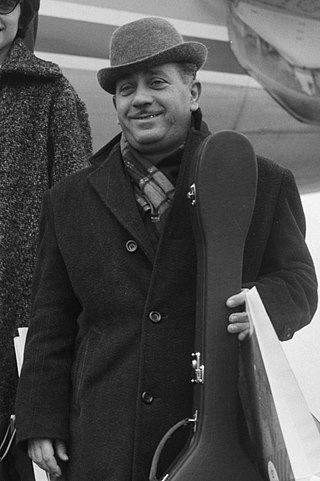
Giorgos Zampetas was a Greek bouzouki musician. He was born in Athens, where he also died, but his origins were from the island of Kythnos.
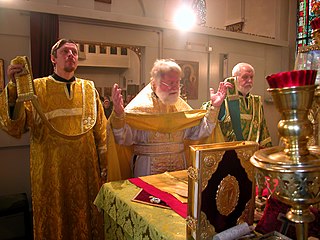
The Cherubikon is the usual Cherubic Hymn sung at the Great Entrance of the Byzantine liturgy.
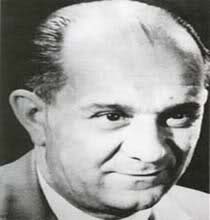
Nikos Tsiforos was a Greek humorist, screenwriter, and film director. He had more than 60 film scripts to his credit between 1948 and 1970. He further directed 17 films between 1948 and 1961.

Mariza Koch is a Greek folk music singer who has recorded many albums since starting her career in 1971. On the wider stage she is best remembered for representing her homeland at the Eurovision Song Contest 1976 with the song "Panagia mou, panagia mou".
Georges Sari or Zorz Sari, a Greek author and actress, was born in Athens. Her mother was French and her father was Greek from Ayvalik, Turkey. She grew up in Greece, where she attended elementary and secondary school. World War II broke out in 1939 and Greeces' entry on the 28th October 1940 before she could finish her schooling.
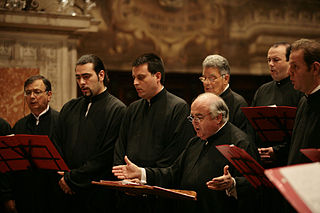
Lykourgos Angelopoulos was a Greek chanter. He was professor at the School of Byzantine Chant at the Conservatory of Athens, the founder and director of the Greek Byzantine Choir and an Archon Protopsaltes of the Patriarchate of Constantinople.

Ta Genethlia Mou is the sixth studio album by Greek singer Elli Kokkinou, released in Greece and Cyprus on 9 December 2011 by The Spicy Effect. It marks her first studio album released under the label and under her renewed collaboration with songwriter and producer Phoebus. It also marks her first studio album in four years since Eilikrina (2007). The album has fifteen songs in total, including two duets and four remixes.
Eleni Vitali is a Greek popular singer and composer of Gypsy origin, active from the early 1970s.
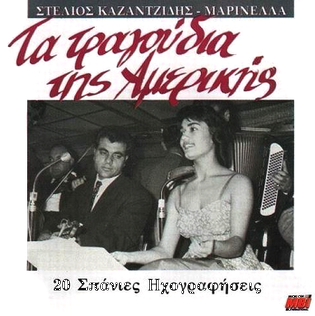
Ta tragoudia tis Amerikis is a double studio album by popular Greek singers Stelios Kazantzidis and Marinella. It was released in 1991 by MBI in Greece and it contains 28 rare recordings that were recorded by Stelios Kazantzidis and Marinella in 1959 and some of those were released on 7" rpm vinyl records in United States, by NINA Records.
Kostas Tournas is one of the pioneers of modern Greek rock. He is a singer and composer of many hits in the '70s including Ti Na Mas Kanei I Nychta.

Popi Malliotaki is a Greek pop-folk singer.
Petros Gaitanos is a Greek singer. He was born and raised in the village of Kokkinogia located in Drama, Greece.

Dimitra Galani is a Greek singer and songwriter.
Poll was a Greek pop group founded in 1971 by Kostas Tournas, Robert Williams, Stavros Logaridis and Kostas Papaioannou. In Greece, it is considered a historic group of the 1970s with pioneering lyrics. Poll is a legendary pop group which resonated with the Greek youth of the '70s, and its songs are viewed as "some of the best songs, which have remained in the history of Greek music". Poll is the most commercially successful Greek band of all time.
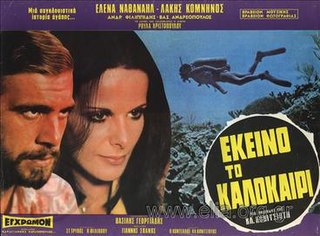
Ekeino to kalokairi is a 1971 Greek film starring Elena Nathanael and Lakis Komninos. It won the photography and music prizes at the 1971 Thessaloniki Festival of Greek Cinema. It was the Greek version of the successful 1970 American film Love Story. The film was one of the greatest successes of Elena Nathanael and the music of its soundtrack "haunted all the teenage parties of the 1970s". Its soundtrack features the hit song "San Me Koitas" which has been described as "one of the most beautiful erotic songs of all time".
Nostradamos was a Greek pop group founded in 1971 by Stelios Fotiadis, Ippokratis Exarchopoulos–also known as Charlie –and English female vocalist Chris King. It was one of the most popular pop groups in Greece which dominated the Greek pop-rock scene in the early to mid-seventies. Despoina Glezou joined the group in time to perform at the 1972 Thessaloniki Song Festival where they won the best new composer and performer prize with the song "Dos Mou to Heri Sou" which became a huge success in Greece during the junta years. Glezou was also a member of the other pioneering Greek pop group Poll. Nostradamos has been ranked as number 9 in a list of the top 10 most influential rock groups during the dictatorship in Greece. In 1974, during the dictatorship, the group won the first Greek Eurovision participation contest run by the state broadcaster ERT to represent Greece at Eurovision but was not allowed to participate due to a scandal.
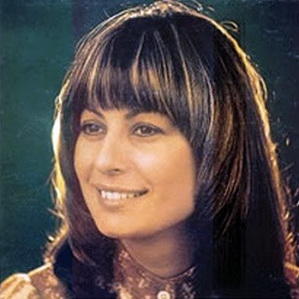
Elisavet Katikaridou Kalamaria, best known as Lizeta Nikolaou, was a Greek singer.
From an interview with Vasilis Papaconstantinou Η χορωδία Αγίας Τριάδας Θεσσαλονίκης μέσα από την ιστορία και το έργο της (1967-2017): μουσικολογικές προσεγγίσεις. Γρηγοριάδου, Ευδοξία. Διπλωματική εργασία Α.Π.Θ. Τμημα Μουσικών Σπουδών, Ιούνιος 2017. http://sophia.mus.auth.gr/xmlui/handle/123456789/1691











